The use of avocado oil is growing globally¹ as people focus on healthier eating. Chronic diseases and heart-related disorders have become a major concern, and so avocado oil is popping up in many cook books and online recipes as a better option.
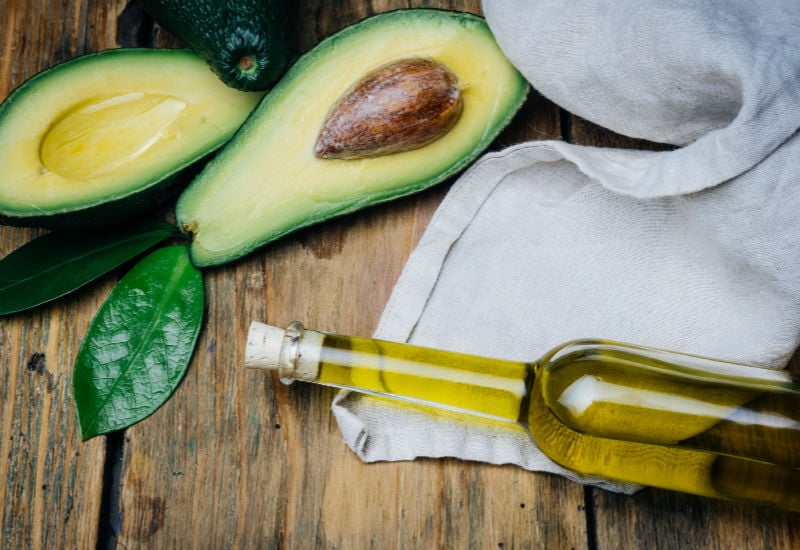
Avocado oil isn’t just revered for its health benefits, it is also useful in the kitchen for its high smoke point. This means it can withstand high heats before burning – perfect for stir-fries and deep-frying.
But not everyone enjoys the flavor of avocado oil, and also it’s expensive. If your household doesn't have any in the kitchen, then you're going to need an avocado oil substitute. Keep reading to find the five best alternatives so that you can finish that recipe without it.
Table of Contents
The 5 Best Avocado Oil Substitutes
1. Extra light olive oil
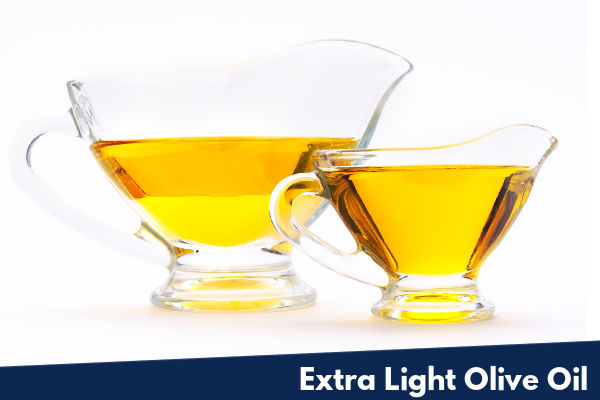 Olive oil is an excellent replacement for avocado oil, and the two can be used interchangeably in recipes. Although avocado oil has a slightly grassy, nutty flavor, it is very mild and borders on neutral. This is the same for extra light olive oil, which has a bland taste that won't mess with the flavor profile of your meal.
Olive oil is an excellent replacement for avocado oil, and the two can be used interchangeably in recipes. Although avocado oil has a slightly grassy, nutty flavor, it is very mild and borders on neutral. This is the same for extra light olive oil, which has a bland taste that won't mess with the flavor profile of your meal.
It is important to choose extra light olive oil because it has a high smoke point of up to 470°F. This is a little lower than avocado oil’s 520°F smoke point but the difference won’t be noticeable in most cooked dishes.
Both oils are predominantly made from monounsaturated fats (mostly oleic acid) and provide high levels of vitamin E. So if you’re into your health and are looking for an alternative with similar levels of antioxidants and vitamins then extra light olive oil is a good choice.
Quick tip: Another common variety of olive oil is extra virgin. Although it is an excellent quality oil, it won’t work as well as a replacement. It isn’t exposed to heat or additional chemicals during processing which results is a stronger flavor that is often peppery, fruity, or even bitter. Its smoke point is also lower than extra light olive oil. These features make it unsuitable for some recipes that call for avocado oil.
Related reading:
Would you like to know what the difference is between olive and canola oil? Be sure to take a look at our article which goes into detail about how they differ.
2. Peanut oil
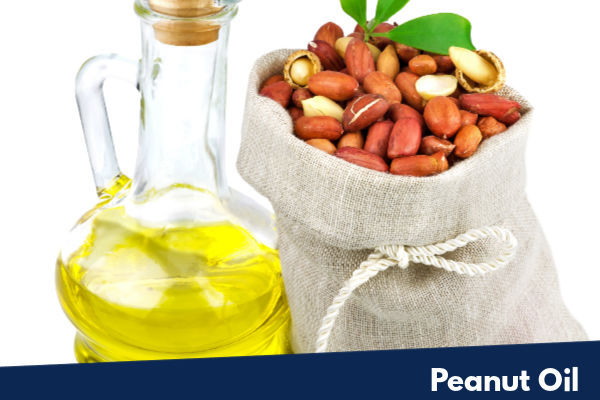
Peanut oil is one of the best alternatives to avocado oil as it also has a high smoke point. It can be used for medium to high-temperature cooking without burning or imparting an unpleasant flavor on the other ingredients.
You’ll need to consider that peanut oil has a slightly nutty flavor. Even though it is mild, it may impact your dish so keep this in mind. When cooking meals like Asian stir-fries or deep-fried tempura, you’ll find this oil adds a delicious extra taste that can improvet the meal. Uncooked food, such as salad dressings and vinaigrettes will also taste great with a liberal splash of peanut oil.
When deep frying food, it won't absorb the flavor of the other ingredients. This means the oil can be reused, and won’t impart any unwanted flavors next time. The ability of peanut oil to maintain its neutral flavor after deep frying is unique to this type of oil.
If you’re on a diet that limits fat intake then peanut oil may not be your best option on this list. Compared to other vegetable oils, it is high in saturated fat, although still lower than coconut oil.
Interesting additional reading:
Got no peanut oil? Check out these useful substitutes.
3. Grapeseed oil
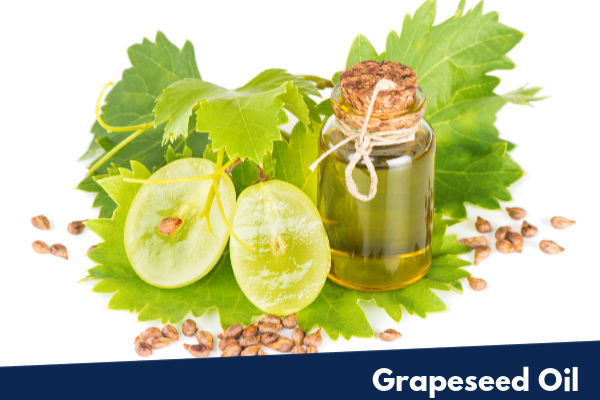
Grapeseed oil is a good backup option for avocado oil if you’re looking to sear or stir-fry your meal. Although its smoke point is lower, it can still hold its own when heated to high temperatures.
Grapeseed has a neutral flavor which makes it excellent for use in baking as it won’t provide any unwanted extra taste. However, if you are looking to use the oil for bread dipping or to splash onto a pizza it isn’t such a good option. You’re better off using extra virgin olive oil, which has more depth of flavor.
Although considered a healthy cooking oil with significant levels of linolic acid, grapeseed has much less monounsaturated fat than avocado oil. Evidence shows that this type of fat can help decrease inflammation, assist with weight loss, and also provide other health benefits².
4. Sesame oil
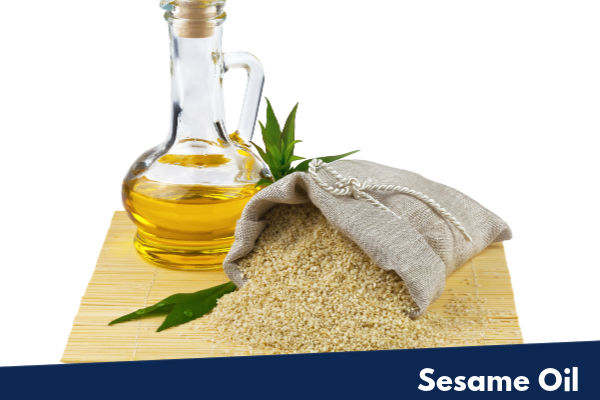
Sesame oil has a nutty, toasty flavor that is delicious in Indian, Chinese, and Korean cuisine. If you’re looking for an oil substitute that can withstand high-heat cooking then light sesame oil is an excellent choice. For anything else, choose a cold-pressed product that hasn’t been exposed to high temperatures or chemicals to reduce its purity. Cold-pressed sesame oil is delicious for use in salads and splashed onto a pizza.
Related reading:
Not sure about the shelf life of sesame oil? Read our article on how long sesame oil lasts.
5. Coconut oil
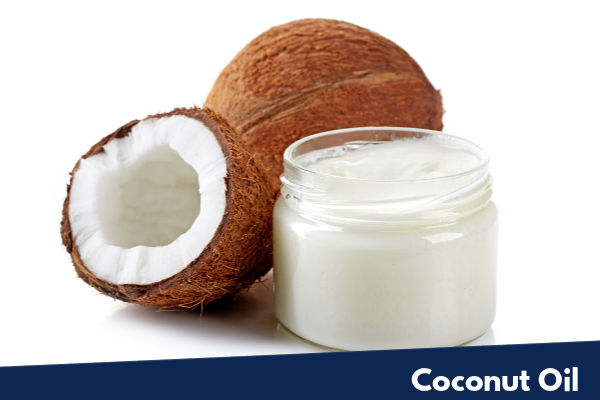
Coconut oil is ideal for replacing avocado oil in baking, as well as medium-heat cooking. We don’t recommend using coconut oil over high heat as it doesn’t always stand up well, particularly deep frying.
Coconut oil offers many health benefits including boosting good cholesterol and helping reduce high blood pressure. Studies have also shown it boosts energy and aids liver health.
When comparing coconut and avocado oil on price, coconut is significantly cheaper. It is also much more readily available in stores.
Related post:
What is a good coconut extract substitute?
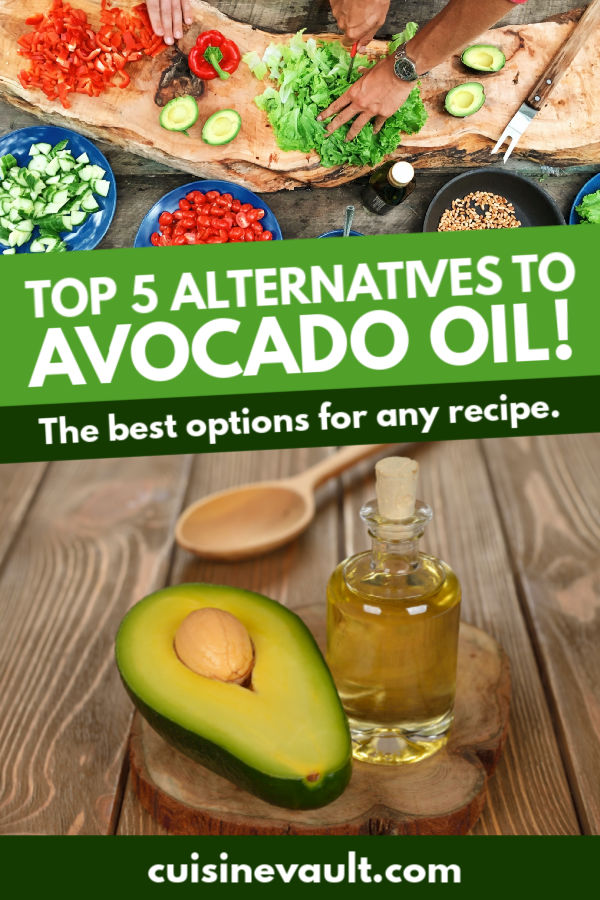
Summing up
Choosing a suitable substitute for avocado oil in cooking is simple, but you’ll need to think about why you’re wanting to replace it. If it's the flavor you don’t enjoy then extra light olive oil makes a good replacement. It has many uses in the kitchen and has similar health benefits.
If your main concern about avocado oil is the price then you may want to choose a more affordable option like sesame or coconut oil. They’ll both work in most recipes, but take into account their stronger flavor profile which may not be welcome in some dishes.
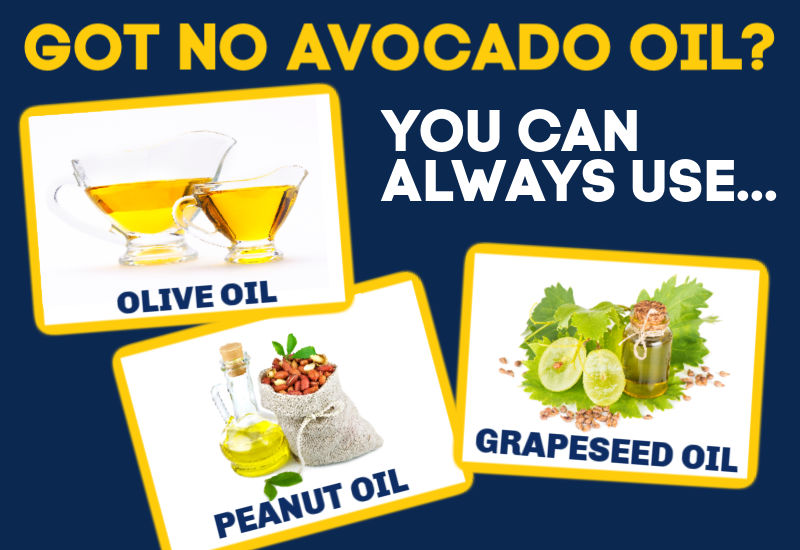
Another option which we didn’t include on the list above is ghee which is a clarified butter. It has higher fat content, but makes amazing cakes and is a tasty addition when rubbed over poultry to make crispy, flavorsome skin. The buttery properties provided by ghee are similar to that of avocado oil.
Do you have a useful alternative to avocado oil? Let us know in the comments below.
References:
[1] https://www.statista.com/statistics/931219/global-avocado-market-value/.
[2] https://www.ncbi.nlm.nih.gov/pubmed/27379574.

Leave a Reply